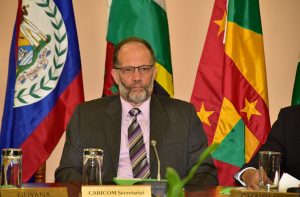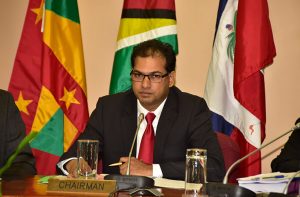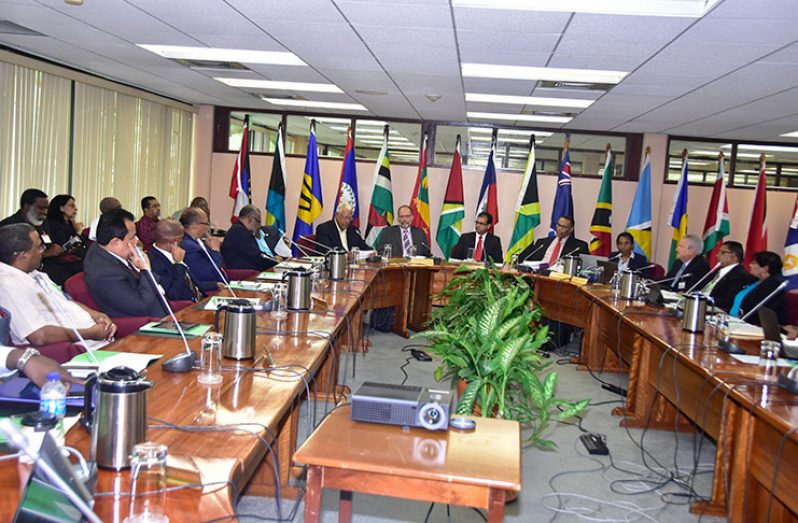MINISTERS of Agriculture within the Caribbean Region have been called upon to take stock of the devastating impact climate change can have on the agriculture sector and food security.
The warning was given by Secretary-General (SG) of the Caribbean Community (CARICOM) Ambassador Irwin LaRocque as he delivered remarks at the opening session of the 71st special meeting of the Council for Trade and Economic Development (COTED) at the CARICOM Secretariat Friday morning.
LaRocque said the conference has come at a time when sections of the Caribbean community are currently reeling from the destructive hands of two Category Five hurricanes. While greater parts of those countries have been gravely affected, the agriculture sectors have also been completely shattered.

Hurricanes Irma and Maria last month wreaked havoc in some Caribbean islands. Hurricane Irma devastated Barbuda, the British Virgin Islands (BVI), Turks and Caicos and Anguilla, as well as St Maarten and St Barts. The islands of Barbuda and Tortola were also left in ruins. Irma also caused significant damage in The Bahamas and Haiti and affected St Kitts and Nevis. The hurricane resulted in 10 deaths within the CARICOM member states and associate members as well as a preliminary estimate of some U.S. $2billion in losses.
Less than a few days later Hurricane Maria struck, leaving a streak of massive destruction in Dominica. That devastation is said to be unparalleled. It accounted for 27 deaths, and more than 13 persons missing, with 95 percent of the country’s buildings and infrastructure damaged in varying degrees. All vegetation was also wiped out.
According to Ambassador LaRocque, the climatic events of the past month were unprecedented. Never before had two Category Five hurricanes ravaged the Region in one season. And never before had a hurricane moved from Category One to Five in less than 24 hours, as was the case with Maria, he said.
NEW NORMAL
“Events like these are likely to become the new normal and provide poor positives in climate change. The devastation caused by the two hurricanes is a stark example of the fact about the new normal of climate change,” the SG told the regional officials.
The meeting, he said, will have added importance with special focus on the need to build further resilience to the agriculture sector.
“As Ministers responsible for Agriculture, you have a strong appreciation of the inherent fragility of the sector, especially to climatic events. You now must priorItise climate change and risk management as one of your programmes,”the Ambassador said.
Due to the recent hurricanes, the conference moved to consider a proposal for the establishment of a Regional Agricultural Emergency Subcommittee from representatives of regional and global partners. The committee will be responsible for the development of a regional emergency response protocol for safeguarding human and livestock health. It involves the containment of diseases and food-safety risks which may arise from hurricanes and other natural disasters. In essence, the committee will seek to get storm-affected agriculture sectors back on their feet.

The conference on Friday heard discussions on a range of other issues including agricultural trade, research and human resource development, business and commodity development, and agricultural health and food safety. All of these, the SG said, are relevant and are able to withstand challenges and ability to respond to emergencies.
A strong and well adapted food and agriculture sector, he said, means that countries are better able to guarantee food security and create larger economic challenges of the Region.
Meanwhile, Chairman of COTED and Suriname’s Minister of Agriculture, Animal Husbandry and Fisheries, Soeresh Algoe, said the conference needed to address the unresolved issues on the COTED agenda. He said it is only by working together that member states would be able to address sustainable agricultural development for the Caribbean Region. He also warned member countries against obstructing trade through the use of non-tariff barriers.
“Despite these challenges, we can seek to improve our economies. I hope that through dialogue we can get new insight into issues that are long on the agenda and that we will overcome, not only in words but deeds.”




.jpg)









